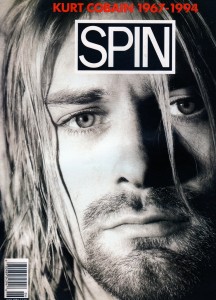K is for Kurt Cobain
Twenty years after the tragic suicide of Kurt Cobain and the consequential end of Nirvana, the band’s influence on rock & roll music remains undisputed as they were just inducted into the Rock & Roll Hall of Fame during their first year of eligibility.
In the recent resurgence of ‘90s fashion and particularly grunge music in youth culture, Cobain occupies the role of the troubled musician – a talented sweetheart in battle with his infamous demons, namely heroin. As copies of his suicide letter pass through the generations, many tend to feel a sympathetic pull to the black and white words, inked in the lyrical pain and flowing empathy so characteristic of Cobain’s writing.
A lesser known side of Kurt Cobain, however, is that he thought of himself as a feminist.

As an up-and-coming rockstar in Seattle, Cobain was caught along the current of third wave feminism emerging in the early 1990’s, namely the punk-rock movement, riot grrrl. A prominent figure within this movement was Kathleen Hanna, the lead singer of Bikini Kill.
A feminist activist and an all-around badass, Hanna collaborated with Cobain on various projects and was the inspiration behind Nirvana’s famous hit “Smells Like Teen Spirit,” after having written “Kurt smells like teen spirit” on Cobain’s bedroom wall.
As Hanna recalled to a crowd in New York City for the Our Hit Parade series in 2010, she and Cobain were “angry young feminists in the ‘90’s.” In one incident, they spray-painted the walls of a teen pregnancy clinic run by a group of right-wing activists who would tell teenage girls that they would go to hell if they chose to have an abortion. While Hanna merely wrote “fake abortion clinic, everyone!” on the walls, Cobain, true to his daring bravado, spray painted “God is gay” on the walls of the clinic in his unique attempt at “public service.” (You can watch the rest of the video here.)
Although Hanna and Cobain eventually went their separate ways, Kurt retained feminist ideals regarding gender equality in the face of misogyny prevalent in the rock & roll scene.
Recalling this time of his life and his earlier issues regarding masculinity in high school, Cobain said in an interview with writer Jon Savage:
“I just always felt that [women] weren’t treated with respect … I mean the words bitch and cunt were totally common. Although I listened to Aerosmith and Led Zeppelin, and I really did enjoy some of the melodies they’d written, it took me so many years to realize that a lot of it had to do with sexism. The way that they just wrote about their dicks and having sex. I was just starting to understand what really was pissing me off so much, those last couple of years of high school. And then punk rock was exposed and then it all came together. It just fit together like a puzzle.” (You can listen to the rest of this rare interview here.)

This distaste for the sexist lyrics and the misogynistic outlook of many of the famous figures in rock & roll would become a recurring theme throughout Cobain’s career.
During the 1992 Video Music Awards, Cobain clashed with Axl Rose, the lead singer of Guns N’ Roses. After Courtney Love asked Axl to consider being the godfather of Frances Cobain, he allegedly shouted, “Shut up, bitch!” and told Kurt to keep his woman in check.
As Cobain retold the events in an interview the following day, many fans complained that Axl was just stating his opinion and that Cobain should just “let him rock the way he rocks,” to which Kurt replied,
“You can’t let a rockstar who obviously likes to beat women and who likes to control women and who likes to tell women to shut up … he doesn’t have the right to speak his mind. Well, he has the right to speak his mind but so do we, and he needs to be shown up.”
Kurt Cobain also transferred this feminist outlook to his songs and incorporated a lot of it into his lyrics. For example, in the song “Been a Son,” he criticized the notion that male children are somehow more valuable than female children, with lyrics like,
“She should have stood out in the crowd / She should have made her mother proud / She should have fallen on her stance / She should have had another chance / She should have been a son.”
Thus, at a time when rock & roll was mostly about having sex with groupies and conquering women, Cobain took the female perspective, singing about what it was like to be in the body of a girl who’s underappreciated and devalued.
In another song, “Sappy,” Cobain sings about a girl who is in an abusive relationship but believes she is happy. “He’ll keep you in a jar / And you’ll think you’re happy,” he sings, criticizing the societal mores instilled in women that happiness in a relationship lies in servitude.
Another prominent topic that Cobain wrote about was rape.
“Rape is one of the most terrible crimes on earth and it happens every few minutes,” he said. “The problem with groups who deal with rape is that they try to educate women about how to defend themselves. What really needs to be done is teaching men not to rape. Go to the source and start there.”
From songs like “Polly” and “Floyd the Barber” to the infamous “Rape Me,” Kurt showed an understanding of rape culture that is still relevant today. Regarding the controversy surrounding “Rape Me” and the overall meaning of the song, Cobain retorted that it was meant to be an anti-rape song, stating, “It’s like she’s saying ‘You’ll never kill me. I’ll survive this…’”

Despite these lengthy interviews and explanations by Cobain, many fans went on to misinterpret these songs. Kurt responded to this group of fans in the liner notes of the album, Incesticide, saying,
“At this point I have a request for our fans. If any of you in any way hate homosexuals, people of different color, or women, please do this one favor for us–leave us the fuck alone! Don’t come to our shows and don’t buy our records. Last year, a girl was raped by two wastes of sperm and eggs while they sang the lyrics to our song ‘Polly.’ I have a hard time carrying on knowing there are plankton like that in our audience.”
In a tragic deja vu of events, the song “Rape Me” was alluded to in the Steubenville Rape Case last year, where a boy present during the assault later tweeted, “Song of the night is definitely ‘Rape Me’ by Nirvana.”
Despite these ignorant interpretations, Kurt Cobain and Nirvana’s legacy in rock & roll music, specifically the grunge genre, remains undisputed. On the 20th anniversary of Cobain’s death and in honor of Nirvana’s induction into the Rock & Roll Hall of Fame, he should be remembered for more than just his music, more than the drugs and the flannel; he should be remembered for being an outspoken fellow feminist.




